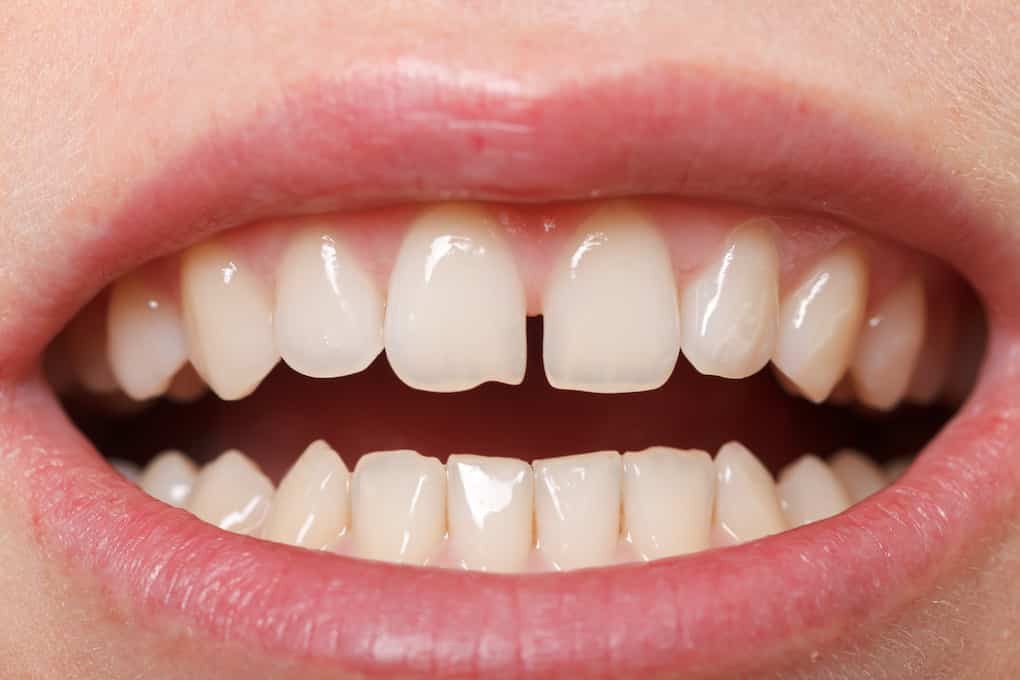Have you ever chipped a tooth?
Dental bonding is the perfect way to brighten your smile without having any major procedure or work done. It’s safe, effective, and lasts for an extended period of time without the need for dentures or tooth replacements.
The process is often used to correct minor chips in front teeth, close gaps between teeth, cover dark stains on tooth surfaces, as well as other cosmetic purposes. If you’re looking for a non-invasive way to improve your smile, we’re covering it all here. We’ll go over cost, purpose, and help you make an informed decision.
What is Dental Bonding and How Does it Work?
If you have minor defects in your smile or teeth, then dental bonding might be right for you. The process is simple and involves applying composite resin to your teeth in order to improve the condition of your teeth.

Dental bonding is often confused with dental veneers. The applications for these two practices are fairly different, but the results are similar in that they both improve your smile and can fix poor or damaged teeth.
Dental veneers replace more than just spots on your teeth and instead are often placed over a number of teeth. This is similar to the way that dentures work except that the veneers are permanent, whereas dentures can be taken in and out at will.
How it Works
To start, your dentist will need to match the resin color to the shade of your teeth. After that, dental bonding can be used on front teeth, back teeth, and even your molars. Dental bonding is a relatively quick process that only takes about an hour to complete.
Once the resin has been matched to your needed shade, it will need to be applied in layers that are very fine coats of lacquer over the top of your existing teeth. Dental bonding typically takes only one office visit to complete. Dental veneers are more expensive than dental bonding because of the process they involve but often provide a better result if extensive damage or work is needed on a tooth.
If your teeth are extensively damaged, then it’s likely that you’ll need a veneer or other type of procedure. Front teeth are the most common for dental bonding because they’re the least likely to chip or have problems.

When to Receive Dental Bonding Treatments
Dental bonding is best when the damage to your teeth isn’t extensive or when you only need a few minor repairs. Dental veneers are often recommended for more extensive work, whereas dental bonding is suited better for smaller areas of defect, and this also means that they’re less expensive than veneer procedures.
You can generally receive this treatment whenever you want it. Because it can be a cosmetic treatment. But, when your tooth is severely chipped it may require you to get a bonding treatment. In those cases, you’ll also give your teeth a better appearance.
Pros and Cons of Dental Bonding
Dental bonding is a safe procedure that doesn’t require anesthesia before being done. Dental veneers are also very easy to apply, and your dentist can correct any problems with them if they arise after the process has been completed. But, as with anything, there are some pros and cons.
Pros of Dental Bonding
- Quick and Easy – dental bonding is a very fast procedure and can be done in one visit to your dentist.
- Looks Natural – one of the best advantages to dental bonding is that it provides a very natural look when completed. In 99% of cases, there’s no evidence left behind that work was done on your teeth.
- Bonding Material is Safe and Non-Invasive – the material used for the bonding and the resin itself is completely safe. It’s also non-invasive, which means no painful dental work or novocaine.
- Easy to Care for – dental bonding doesn’t require any special treatments outside of regular flossing and brushing.
Cons of Dental Bonding
- Staining – As with any perfectly white and clean substance, there is the potential for staining over time. You can avoid this by getting regular cleanings and having good habits around brushing and flossing.
- Durability and Longevity – dental bonding isn’t the most durable option on the market. While it has the potential to last for 15-20 years or more, it’s common to need to re-apply every 10 years or so.
Risks of Dental Bonding
There are few dangers to receiving dental bonding treatments, and in many cases, consumers are pleased to know there are few risks. However, one of the biggest risks is that the resin will chip after it’s applied to your teeth.
The best way to avoid damage to your teeth after receiving a bonding treatment is to get rid of any old habits that could cause the resin to crack or chip. Biting your nails, chewing on ice, pens, or any other items can sometimes cause significant wear and chipping.
Cost of Dental Bonding
You might not expect it, but dental bonding isn’t all that expensive. The cost is mostly determined by how many treatments you need and how large the area is. Many dental practices will charge between $500 – $2500 for basic bonding treatments.
Another thing that can determine the cost or price you pay is the material used for the resin. Some higher-end longer-lasting materials are significantly more expensive.
Caring for Teeth After Dental Bonding
Thankfully there aren’t too many things that you’ll need to do after your treatments to take care of the teeth. Dental bonding itself doesn’t require the same strict brushing and flossing that other treatments might. Dental veneers are often a bit more strenuous to clean, but dental bonding isn’t too difficult and can be managed with regular brushing and flossing.
Here are some things you can do after:
- Brush your teeth at least twice a day with fluoride toothpaste.
- Floss once daily to remove any food or debris that could potentially get stuck on your teeth and cause problems.
- Eat a healthy diet, and try to avoid sugary or acidic foods that could cause enamel erosion on your teeth over time.
- Avoid biting your nails, chewing on pens or pencils, or opening things with your teeth.
See a Dental Professional Every Six Months
It’s best to brush your teeth twice a day and floss once daily, but it still doesn’t replace regular dental cleanings. Dental professionals can catch any issues that you might miss and help to protect your teeth over time. Dental cleanings are quick, painless, and affordable. If you’re looking to avoid issues with their teeth, then don’t neglect to visit the dentist every six months or so to get a cleaning and to have them check your mouth for tooth decay.
At Wayzata Dental we offer a number of cosmetic dental treatments and restorative services to keep our patients loving their smiles from dawn until dusk. There’s no reason for you to be afraid of sharing your smile with the world around you, and it’s our job to make sure that you have the chance to share that smile.
You can learn more about our cosmetic dental practices on our website, read our blog for more info on dental health and treatments, or reach out with any questions you have about treatment. Book an appointment with us today to receive your dental bonding or veneer treatment.




